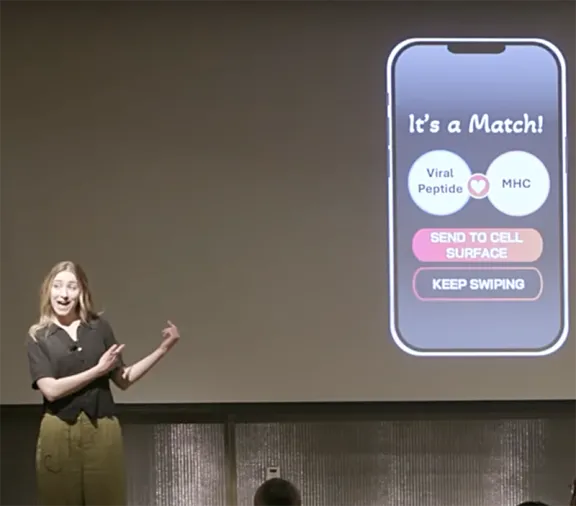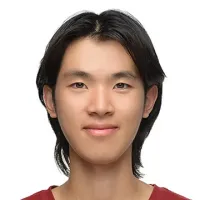
UCSF Student's HIV Research Talk Wins UC-Wide Grad Slam
Is it easier to find your date on Tinder or is it easier to find the next molecular target for HIV?
Sophia Miliotis, winner of both the UCSF and UC Grad Slams, thinks her research might provide an answer.
“Because finding love is a mess, but finding HIV? Doesn’t have to be,” Miliotis said during her presentation titled “Finding HIV: A Swipe in the Right Direction.”
Miliotis, a PhD student in the Pharmaceutical Sciences and Pharmacogenomics (PSPG) Program, beat out 10 finalists at Byers Hall Auditorium on April 2 to win UCSF Grad Slam's first place and People’s Choice award, taking home $4,750.
First place winners from Grad Slams at individuals UC campuses then squared off in Sacramento on April 29 for the UC-wide Grad Slam competition, which Miliotis also won, taking home $7,000.
Miliotis’ research seeks to address the elusive molecular targets for HIV due to its rapid rate of mutation. HIV has nine main proteins made of many peptides.
In any human cell, MHC proteins bind to fragments of pathogens and display them on the cell surface so immune cells like T cells can detect and destroy infected cells.
Initially, T cells form an immunological memory of HIV peptides. However, the previously recognized viral peptides become less recognizable because of the rapid mutation.
Nonetheless, these peptides are still “matching” with MHCs and appear at the cell surface. If these peptides can be identified, the cells where HIV resides can be targeted and killed.
“But here’s the problem,” Miliotis said. “Right now, we’re simply guessing at which peptides might match with MHC and testing one by one. And with millions of possibilities, we’re stuck in that infinite scroll.”
That is why Miliotis uses the EpiScan, a tool developed by UCSF researcher Peter Bruno, to build a database of peptides. In EpiScan-engineered cells, stronger peptide-MHC binding results in more of those complexes appearing on the cell surface.
“The level of MHC is just a proxy for how strong that HIV peptide binds to the MHC, which directly means how good of an immunotherapeutic target it is,” Miliotis said.
Thus, this library can reveal the peptides that would be the best molecular targets for new HIV treatments. At present, antiretroviral medications cannot eliminate HIV but only stop their replication. Miliotis’ research can help develop future therapeutics such as a vaccine.
The champion imparted some winning advice — starting with having confidence despite not yet having significant research results.
“You don’t have to have your research all figured out yet. It’s more about telling a really compelling story,” Miliotis said.
She encouraged students to take the opportunity to learn something different.
“It just stretches a whole other kind of skill set that graduate students don’t always get to stretch,” she said.
Miliotis shared her victory with people from her lab, who encouraged her to participate and provided feedback. The central analogy of her speech — dating apps — was developed over many iterations with friends and lab members.
When it comes to planning, Miliotis said she is the type of person who prepares early and memorizes everything. To memorize her presentation, she paired certain gestures with certain parts of the speech.
She suggested recording the presentation multiple times even if it is “cringy.” The content of her initial video submission was significantly altered by the time the final competition came around, she said.
The UCSF Grad Slam second-place winner’s research also aims to create technologies to assist our immune system in fighting off diseases. But instead of infectious diseases, the target is brain cancer.
Maggie Colton Cove, a PhD student also enrolled in the PSPG program, took home the second-place prize for her talk titled “Building Biological Sleeper Agents to Fight Brain Tumors.”
Her goal is to enhance CAR T-cell therapies, once considered an exciting new treatment but now the cornerstone of cancer treatment.
“We can take a patient’s T cells and fit them out with a receptor that acts almost like an antenna, locking in on cancer specific markers, and directing the T cells’ tumor killing machinery against them,” Cove said. “These receptors are called CARs.”
Although CAR T-cell therapies are usually extremely effective against cancers, Cove works with a type of deadly pediatric brain tumor called medulloblastomas, which grows in the cerebellum. CAR T-cell therapies have a major flaw when it comes to the brain.
“CAR T cells are incredibly activated but activated T cells are also more likely to enter a state of … exhaustion,” Cove said.
CAR T cells work well in the bloodstream, which makes them effective against leukemia. But when the tumor is in the brain, the cells burn out before reaching it, and the brain does not have other immune cells that usually support T cells in the blood stream.
Thus, Cove aims to boost immunotherapy by engineering a switch on the CAR proteins that activates upon detecting brain-specific proteins — helping T cells conserve energy until they reach their target.
To achieve second place, Cove said she focused on sounding fresh by switching up intonation and gestures during each delivery, so the speech would never sound “locked in.” And unlike other competitors, she used a few different comparisons, which better suited her topic.
“I didn’t engage with one single analogy, which I think helped me be a little flexible, because sometimes if the analogy is not perfect, you have to spend some time fitting everything in,” Cove said.
Cove also recommended testing different ideas.
“I think things like feeling comfortable giving yourself room to improvise or make different choices … help you relax and be yourself,” Cove said. “You are excited about your research and so if you let that shine free, you’re going to get the audience excited, too.”



